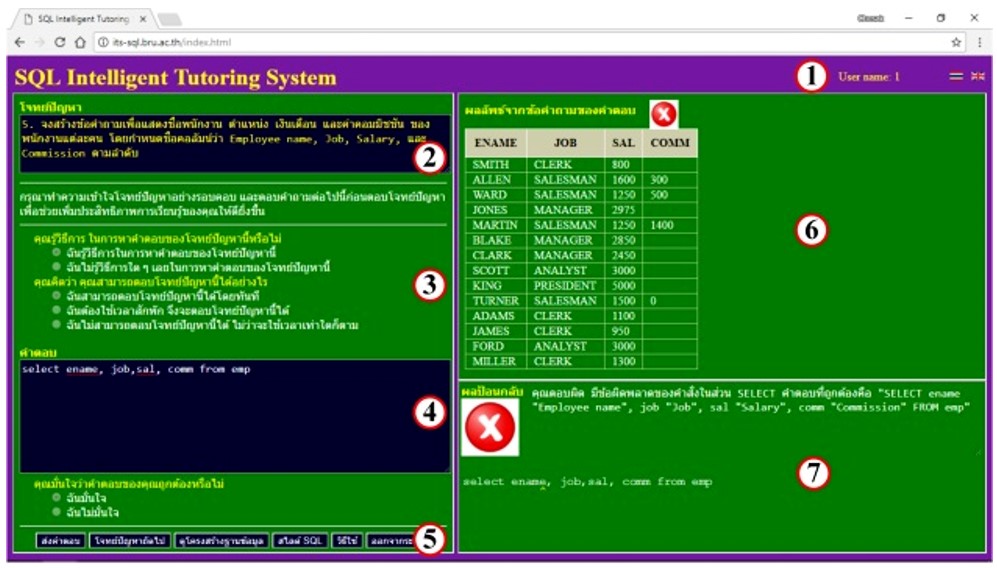การออกแบบแบบจําลองการให้ผลป้อนกลับบนฐานการรู้คิดของผู้เรียนในการเรียนรู้ภาษาสอบถามเชิงโครงสร้าง
Main Article Content
Abstract
Chusak Yathongchai, Thara angskun and Jitimon Angskun
รับบทความ: 15 กุมภาพันธ์ 2561; ยอมรับตีพิมพ์: 15 พฤษภาคม 2561
บทคัดย่อ
บทความนี้นำเสนอการออกแบบแบบจำลองการให้ผลป้อนกลับตามการรู้คิดของผู้เรียน เพื่อนำไปใช้ในระบบการสอนเสริมอัจฉริยะที่ใช้รูปแบบการเรียนรู้แบบแก้ปัญหา โดยใช้เนื้อหาภาษาสอบถามเชิงโครงสร้างเป็นกรณีศึกษา บทความนี้ได้เสนอแนวทางการให้ผลป้อนกลับ 2 ด้าน คือ การคิดและการรู้คิด ในด้านการคิด ได้กำหนดรูปแบบการให้ผลป้อนกลับที่หลากหลายมีทั้งหมด 5 รูปแบบจากผลป้อนกลับ 4 ประเภท โดยใช้กลยุทธ์การให้ผลป้อนกลับแบบคงที่ 3 รูปแบบ คือ บอกความถูกต้องของคำตอบ บอกตำแหน่งที่ผิด และบอกเป็นนัย และกลยุทธ์การให้ผลป้อนกลับแบบปรับตัว 2 รูปแบบ คือ รูปแบบการให้ผลป้อนกลับตามลำดับ ได้แก่ บอกความถูกต้องของคำตอบ บอกตำแหน่งที่ผิด บอกเป็นนัย และบอกผลเฉลย โดยแต่ละโจทย์ปัญหาเริ่มต้นจากลำดับที่ 1 และรูปแบบให้ผลป้อนกลับ ตามลำดับ โดยลำดับเริ่มต้นของแต่ละโจทย์ปัญหาจะได้มาจากผลการแก้ไขโจทย์ปัญหาในข้อก่อนหน้านี้ ส่วนในด้านการรู้คิดได้ใช้คำถามสะท้อนการรู้คิดของผู้เรียน การสร้างแบบจำลองนี้ใช้ปัจจัยนำเข้าเกี่ยวกับการรู้คิด 4 ปัจจัย คือ ความเข้าใจในโจทย์ปัญหา ความยากของโจทย์ปัญหาตามความคิดของผู้เรียน ความมั่นใจในคำตอบ และความยากของโจทย์ปัญหา มีปัจจัยวิเคราะห์ประสิทธิภาพ 2 ปัจจัย คือ ระดับความพยายาม และเวลาที่ใช้แก้ปัญหา โดยแบบจำลองอยู่ในรูปของกฎที่มีจำนวน 33 กฎ ที่เป็นทางเลือกในการกำหนดรูปแบบการให้ผลป้อนกลับที่เหมาะสมตามการรู้คิดของผู้เรียนที่แตกต่างกัน ที่จะช่วยพัฒนาผู้เรียนทั้งทางด้านการคิดและการรู้คิด ผลการทดสอบประสิทธิภาพของแบบจำลองมีค่าความแม่นเฉลี่ยถ่วงน้ำหนักเท่ากับ 0.91 ส่วนค่าความเที่ยง ค่าความระลึก และค่าประสิทธิภาพโดยรวมมีค่าเฉลี่ยถ่วงน้ำหนักของทุกค่าเท่ากัน คือ 0.77
คำสำคัญ: การให้ผลป้อนกลับ การรู้คิด ระบบการสอนเสริมอัจฉริยะ ภาษาสอบถามเชิงโครงสร้าง
Abstract
The purpose of this research aimed to design a feedback model based on student metacognition. The design would be incorporated in an intelligent tutoring system using a problem–solving approach. Structured Query Language (SQL) teaching was used as a case study for the problem–solving approach. This research proposed feedback guidelines in both cognitive and metacognitive functions. Regarding the cognitive function, five feedback stra-tegies with four feedback types were determined. Three out of five were non–adaptive strategies called knowledge of the results, error flagging, and hints. The other two were adaptive strategies. One provided feedback in sequence of knowledge of the results, error flagging, hints, and knowledge of correct response. The other provided feedback in sequence based on results from the previous problem–solving. Regarding the metacognitive function, the reflective ques-tions were used to reflect metacognition of students. The designed model employed the four metacognitive factors as inputs. They were the learner’s perception of the problem understanding; the learner’s perception of the problem difficulty level; the confidence of answer; and the problem difficulty level. The effort level and time to solve the problem were factors used to determine the feedback strategies. There were thirty–three rules in the model used to decide the appropriate feedback strategies based on students’ metacognition. The model had potential to improve students both in terms of cognition and metacognition. The evaluation results indicated that the model had 0.91 of the weighted average of accuracy and 0.77 of the weighted average of precision, recall, and f-measure.
Keywords: Feedback, Metacognition, Intelligent tutoring system, SQL
Downloads
Article Details

This work is licensed under a Creative Commons Attribution-NonCommercial 4.0 International License.
References
Bhagat, S., Bhagat, L., Kavalan, J., and Sasikumar, M. (2002). Acharya: An intelli-gent tutoring environment for learning SQL.
Proceedings of the Vidyakash 2002 International Conference on Online Learning. St. Louis, Missouri, USA.
Dekeyser, S., Raadt, M. D., and Lee, T. Y. (2007). Computer assisted assessment of SQL query skills' ADC '07 Proceedings of the Eighteenth Conference on Australasian Database (pp. 53–62). Ballarat, Victoria, Australia.
Dollinger, R. (2010). SQL lightweight tutoring module–semantic analysis of SQL queries based on XML representation and LINQ. World Conference on Educational Mul-timedia, Hypermedia and Telecommunications (EDMEDIA) 2010 (pp. 3323–3328). Toronto, Canada.
Gama, C. A. (2004). Integrating Metacognition Instruction in Interactive Learning Environments. Ph.D. Dissertation, United Kingdom: University of Sussex.
Kerdprasop, N. (2004). Principles of Programming Languages. Nakhon Rat-chasima: Suranaree University of Technology. (in Thai)
Kirschner, P. A., Sweller, J., and Clark, R. E. (2006). Why minimally guided learning does not work: An analysis of the failure of discovery learning, problem–based learning, experiential learning and inquiry–based learning. Educational Psychologist 41(2): 75-86.
Mitrovic, A. (1998). A Knowledge-based teaching system for SQL. In Ottmann, T. and Tomek, I. (Eds.), ED–MEDIA 98 World Conference on Educational Multimedia and Hypermedia (pp. 1027–1032). Freiburg, Germany.
Mitrovic, A. (2003). An intelligent SQL tutor on the web. International Journal of Artificial Intelligence in Education 13(2–4): 173–197.
Narciss, S. (2008). Feedback strategies for interactive learning tasks. In J.M. Spector, Merrill, M. D., van Merrienboer, J. J. G. and Driscoll, M. P. (Eds.), Handbook of Research on Educational Communications and Technology (pp. 125–144). Mahaw, NJ: Lawrence Erlbaum.
Narciss, S., and Huth, K. (2004). How to design informative tutoring feedback for multimedia learning. In Niegemann, H. M., Leutner, D. and Brunken (Hrsg.), R. (Eds.), Instructional design for multi-media learning (pp. 181–195). Munster, New York: Waxmann.
Pahl, C., and Kenny, C. (2009). Interactive correction and recommendation for computer language learning and training. IEEE Transactions on Knowledge and Data Engineering 21(6): 854-866.
Samtia, K. (2551). The Development of PRIPARE Instructional Model to Develop Metacognition of Young Children. Dissertation, Ed.D. (Early Childhood Education). Bangkok: Srinakharinwirot University. (in Thai)
Schraw, G., and Dennison, R. S. (1994). Assessing metacognitive awareness. Contemporary Educational Psychology 19(4): 460–475.
Seyed-Abbassi, B. (1993). A SQL project as a learning method in a database course. SIGCPR '93 Proceedings of the 1993 conference on Computer personnel research (pp. 291–297). St Louis, Missouri, USA.
Shute, V. J. (2007). Focus on Formative Feedback. Princeton, NJ: Educational Testing Service.
Soldato, T. d., and Boulay, B. D. (1995). Implementation of motivational tactics in tutoring systems. Journal of Artificial Intelligence in Education 6(4): 337–378.
Walpole, R. E., Myers, R. H., Myers, S. L., and Ye, K. (2012). Probability & Statistics for Engineers & Scientists. 9th ed. Boston: Prentice Hall.
